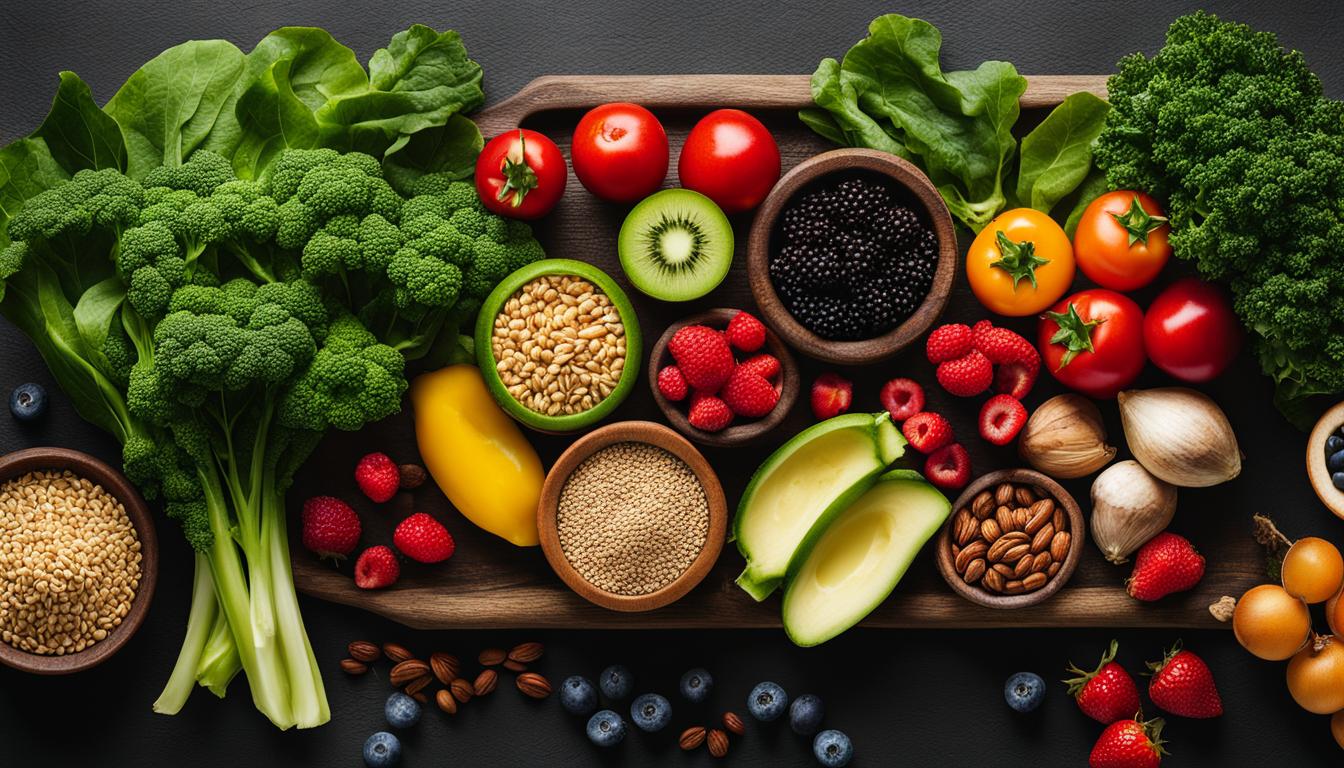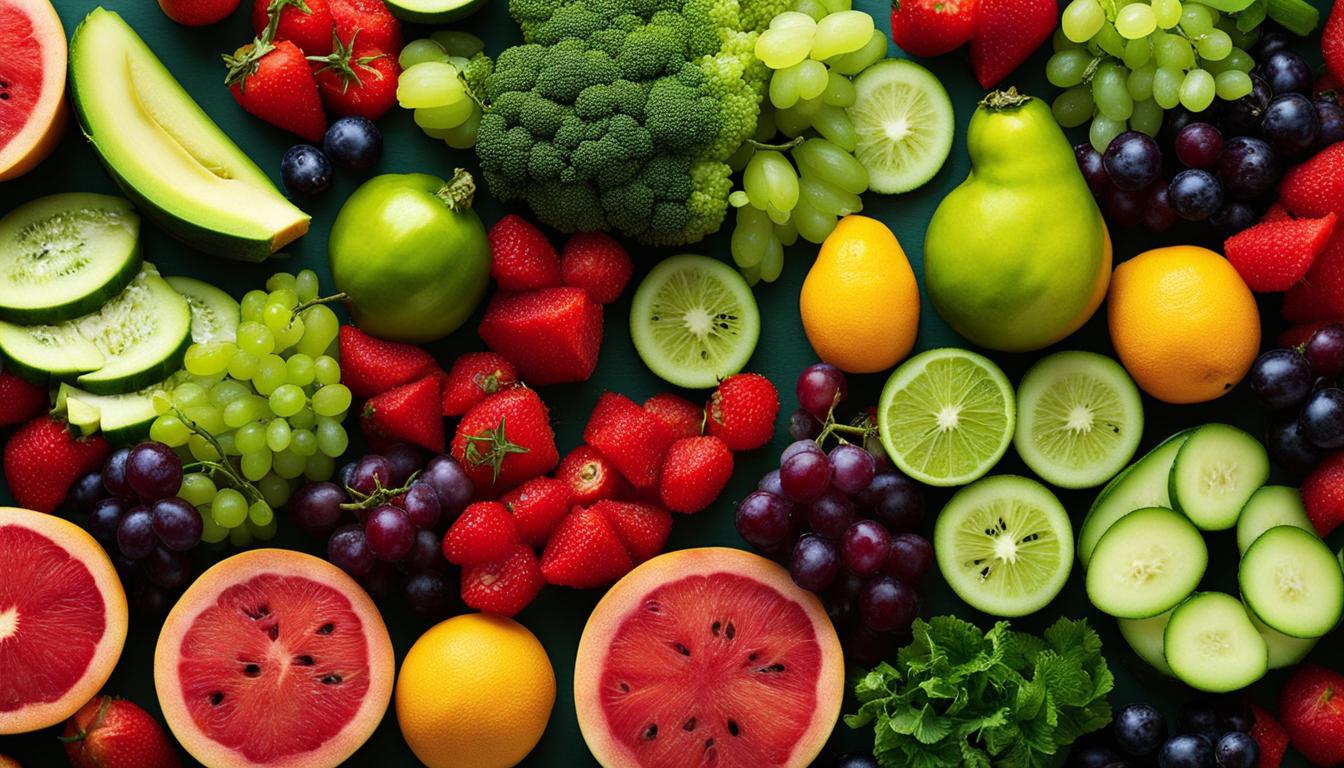Aging is a natural process that affects all of us, but did you know that incorporating antioxidants into your lifestyle can help slow down the aging process? Antioxidants are powerful substances found in certain foods and supplements that help protect our cells from damage caused by free radicals. Free radicals are unstable molecules that can contribute to aging by causing oxidative stress in our bodies.
By neutralizing free radicals, antioxidants can help prevent cellular damage and promote overall health and well-being. They are known to have a range of benefits, including reducing the risk of chronic diseases, improving skin health, and supporting cognitive function.
In this article, I will explore how antioxidants play a crucial role in preventing aging and why they are nature’s shield against the effects of time. Join me as we delve into the science behind aging, the impact of free radicals, and the importance of antioxidants in maintaining a youthful appearance and overall health.
Key Takeaways:
- Antioxidants are substances that help protect our cells from damage caused by free radicals.
- Free radicals contribute to aging by causing oxidative stress in our bodies.
- Incorporating antioxidants into our lifestyle can help prevent cellular damage and promote overall health.
- Antioxidants have a range of benefits, including reducing the risk of chronic diseases, improving skin health, and supporting cognitive function.
- By understanding the science behind aging and the role of antioxidants, we can make informed choices to slow down the effects of time and maintain a youthful appearance.
The Aging Process: Factors and Theories
Aging is a time-dependent process that is influenced by both genetic and environmental factors, with genetics accounting for 25% and environmental conditions accounting for 75% of the aging process. Over 300 theories have been proposed to explain the mechanisms behind aging, but none have been universally applicable.
“Aging is a complex process influenced by various factors.”
The oxidative stress theory suggests that reactive oxygen species (ROS), particularly those produced by mitochondria, contribute to the aging process. Mitochondrial dysfunction due to oxidative stress is considered a contributor to aging.
“Mitochondrial dysfunction plays a role in the aging process.”
Other theories, such as the somatic mutation theory and telomere loss theory, propose additional mechanisms for age-related ailments. However, it is widely accepted that free radicals, or ROS, play a significant role in the development of aging.
- Oxidative stress and mitochondrial dysfunction contribute to aging.
- Somatic mutation theory proposes genetic mutations leading to aging.
- Telomere loss theory suggests telomere shortening as a cause of aging.
Risk Factors for Aging
While aging itself is an inevitable natural process, there are several risk factors that can accelerate the aging process:
- Unhealthy lifestyle choices, such as smoking, excessive alcohol consumption, and poor diet.
- Chronic diseases, including cardiovascular disease, diabetes, and neurodegenerative disorders.
- Exposure to environmental factors, such as pollution, radiation, and toxins.
- High levels of stress and chronic psychological distress.
Addressing these risk factors and adopting a healthy lifestyle can potentially slow down the aging process and improve overall well-being.
Free Radicals and Aging
The aging process is influenced by various factors, and one theory that has gained significant attention is the free radical theory of aging. According to this theory, aging occurs due to the accumulation of damage caused by free radicals in the body.
Free radicals are unstable molecules that are produced during normal cellular metabolism. They contain an unpaired electron, which makes them highly reactive. These reactive free radicals can interact with and damage cellular components, including DNA, proteins, and lipids.
Oxidative stress is a consequence of the imbalance between free radical production and the body’s antioxidant defense system. When there are excessive free radicals and insufficient antioxidants to neutralize them, oxidative stress occurs.
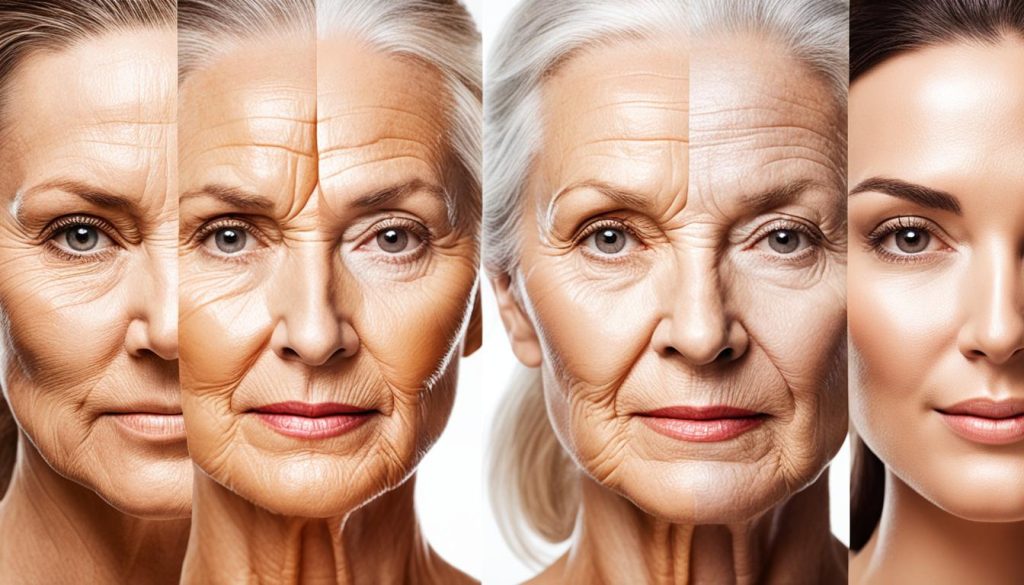
Skin aging is a prime example of the impact of oxidative stress on the aging process. The skin is constantly exposed to environmental factors, such as UV radiation and pollution, which can generate free radicals. Additionally, intrinsic factors, such as the natural aging process and genetic predispositions, contribute to increased oxidative stress in the skin.
The destructive effects of oxidative stress on the skin include collagen degradation, impaired skin barrier function, and the formation of wrinkles and fine lines. These visible signs of aging are attributed, in part, to the damaging effects of free radicals on skin cells and connective tissues.
“The free radical theory of aging suggests that aging is caused by the accumulation of damage caused by free radicals.”
While the free radical theory of aging was initially proposed decades ago, it was dismissed in 2014 as the sole explanation for the complex process of aging. However, the role of oxidative stress and the impact of free radicals on cellular damage and aging are still recognized in scientific research.
To further understand the interplay between free radicals and aging, let’s delve into the role of oxidative stress in cellular damage and explore the mechanisms behind skin aging.
Oxidative Stress and Cellular Damage
Oxidative stress occurs when the balance between free radicals and antioxidants is disrupted, leading to an overabundance of free radicals. These free radicals can instigate a cascade of reactions that result in cellular damage and dysfunction.
Here are some key aspects of oxidative stress and its effect on cells:
- Free radicals can directly damage cellular structures such as DNA, proteins, and lipids. This damage can lead to genomic instability, protein misfolding, and lipid peroxidation.
- Oxidative stress can trigger inflammation, as free radicals can activate signaling pathways that promote the production of pro-inflammatory molecules.
- Prolonged exposure to oxidative stress can accelerate cell aging and contribute to the development of age-related diseases.
- Antioxidants play a vital role in mitigating oxidative stress by neutralizing free radicals and preventing cellular damage. The body produces endogenous antioxidants, such as superoxide dismutase and glutathione, but can also obtain antioxidants from external sources, including dietary and topical sources.
Oxidative stress and its impact on cellular damage underline the significance of controlling free radical levels in the body to slow down the aging process.
The Effects of Oxidative Stress on Skin Aging
The skin is particularly vulnerable to oxidative stress due to its constant exposure to external stressors, including UV radiation and environmental pollutants. Additionally, intrinsic factors such as age-related decline in antioxidant defense mechanisms further contribute to oxidative stress in the skin.
Here are some effects of oxidative stress on skin aging:
- Collagen degradation: Oxidative stress can degrade collagen, a crucial protein responsible for skin’s elasticity and firmness. Collagen degradation leads to sagging skin and the formation of wrinkles and fine lines.
- Loss of skin barrier function: Oxidative stress can disrupt the skin’s protective barrier, leading to increased moisture loss, dryness, and increased susceptibility to environmental damage.
- Increased pigmentation: Oxidative stress can trigger the overproduction of melanin, leading to age spots, hyperpigmentation, and an uneven skin tone.
By understanding the impact of oxidative stress on skin aging, researchers and skincare professionals can develop strategies to minimize free radical-induced damage and promote healthy, youthful-looking skin.
The Role of Antioxidants in Aging Prevention
Antioxidants play a crucial role in preventing cellular damage and aging. As free radical scavengers, they neutralize reactive oxygen species (ROS) and protect against the harmful effects of oxidative stress. While ROS are known to cause cellular damage, they also have important roles in signaling pathways and cellular senescence.
By reducing oxidative stress, antioxidants can prevent DNA damage and inhibit cellular senescence, ultimately promoting longevity and preventing age-related diseases. The use of antioxidants in dietary supplements and topical treatments has gained popularity in the field of anti-aging and skincare.
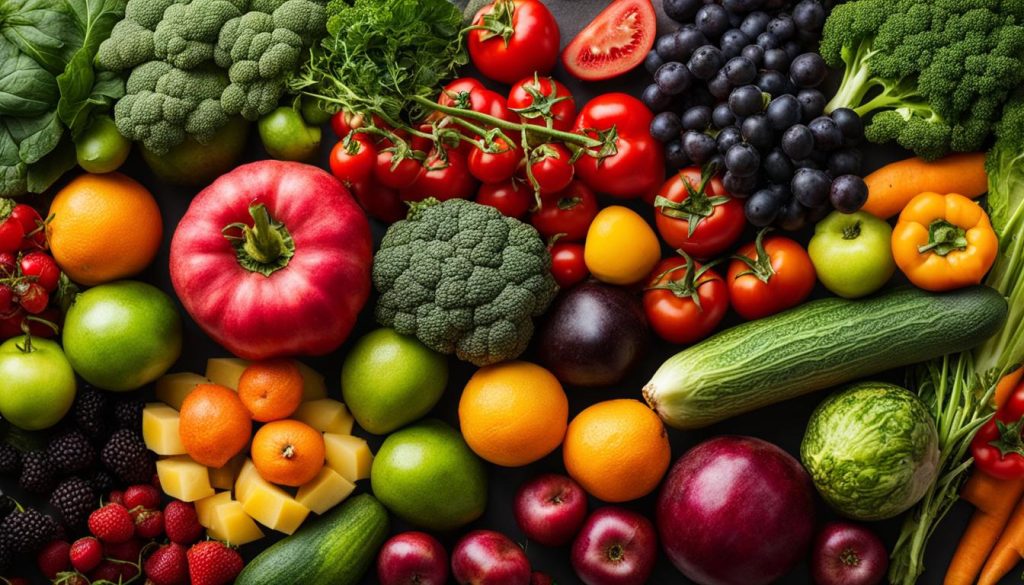
Research has shown that antioxidants can reduce oxidative stress and prevent age-related cellular damage. They help maintain the integrity of cellular components and protect against the accumulation of reactive oxygen species. This protective effect extends to various organs and tissues, including the skin.
“Antioxidants can reduce oxidative stress, prevent DNA damage, and inhibit cellular senescence, thus promoting longevity and preventing age-related diseases.”
A key mechanism through which antioxidants exert their anti-aging effects is by inhibiting cellular senescence. Cellular senescence is a state of permanent growth arrest that contributes to aging and age-related diseases. By inhibiting cellular senescence, antioxidants contribute to the preservation of cellular function and the prevention of age-related ailments.
Table: Antioxidants and Their Effects on Aging Prevention
| Antioxidant | Effect on Aging Prevention |
|---|---|
| Vitamin C | Reduces oxidative stress, promotes collagen synthesis, and protects against UV-induced skin damage |
| Vitamin E | Protects cell membranes from oxidative damage and reduces the risk of cardiovascular diseases |
| Resveratrol | Activates sirtuins, which promote cellular health and longevity |
| Curcumin | Exhibits anti-inflammatory and antioxidant properties, protecting against age-related cognitive decline |
Antioxidants are available in various forms, including dietary supplements and topical skincare products. Incorporating antioxidant-rich foods into your diet and using antioxidant-based skincare products can provide additional benefits for aging prevention and overall health.
The Impact of Antioxidants on Skin Aging
Antioxidants play a crucial role in promoting skin health and defending against aging. They offer protection against the damaging effects of UV radiation, environmental pollutants, and other external factors that can accelerate skin aging. With their ability to reduce oxidative stress, enhance cellular fitness, and promote the production of extracellular matrix proteins, antioxidants have become a key component in skincare products.
When applied topically, antioxidants can penetrate the skin and provide photoprotection by neutralizing harmful free radicals. They help to prevent collagen degradation, maintain skin elasticity, and reduce the appearance of fine lines and wrinkles. By improving the skin’s ability to repair and regenerate, antioxidants can contribute to a more youthful and radiant complexion.
Various natural antioxidants have been studied for their skin-rejuvenating properties. One notable example is resveratrol, a polyphenol found in grapes and red wine. Research has shown that resveratrol can alleviate cellular senescence and improve cellular function, leading to improved skin health.
The Benefits of Antioxidants for Skin Health:
- Protection against UV-induced damage
- Reduction of oxidative stress
- Enhancement of skin repair and regeneration
- Promotion of collagen synthesis
- Reduction of fine lines and wrinkles
- Improvement of overall skin texture and tone
By incorporating antioxidants into your skincare routine, you can reap the benefits of their skin-protective and anti-aging properties. Look for products that contain potent antioxidants such as vitamins C and E, green tea extract, and coenzyme Q10. These ingredients can help maintain skin health and combat the signs of aging.
| Antioxidant | Source | Benefits |
|---|---|---|
| Vitamin C | Citrus fruits, berries | Boosts collagen production, brightens skin |
| Vitamin E | Nuts, seeds, vegetable oils | Protects against UV damage, moisturizes skin |
| Green Tea Extract | Green tea leaves | Reduces inflammation, fights aging |
| Coenzyme Q10 | Fish, meat, whole grains | Antioxidant and energizing for skin cells |
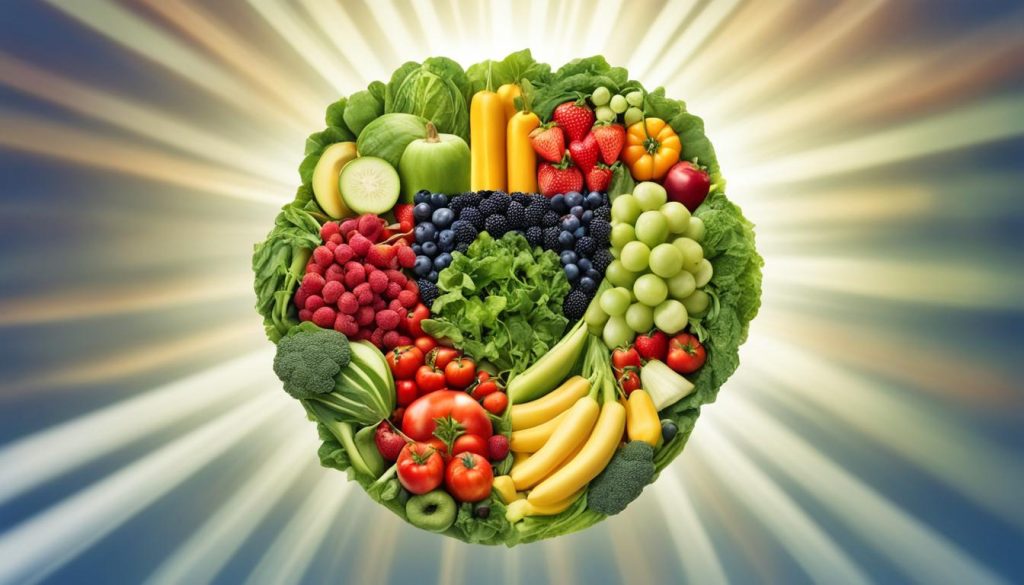
“Using antioxidants in your skincare routine can help protect your skin from environmental damage and promote a youthful, healthy complexion.”
The Importance of Antioxidants in Disease Prevention
Oxidative stress, characterized by an imbalance between reactive oxygen species (ROS) production and antioxidant defense systems, is closely linked to the development of various diseases. Among them, cardiovascular diseases, neurodegenerative diseases, and cancer are prominent examples. Antioxidants, found abundantly in nature, play a crucial role in counteracting oxidative stress and reducing the risk of these diseases.
How do antioxidants contribute to disease prevention? Firstly, antioxidants have the ability to neutralize ROS, which can cause oxidative damage to cells and tissues. By scavenging free radicals, antioxidants protect cellular components, such as proteins, lipids, and DNA, from oxidative stress-induced harm. This protective effect helps to maintain the overall integrity and function of cells and tissues.
Moreover, antioxidants regulate redox signaling pathways, which are responsible for cellular processes such as proliferation, cell death, and inflammation. By modulating these pathways, antioxidants help maintain a balanced cellular environment and prevent abnormal cell behavior associated with disease development.
Furthermore, antioxidants prevent the accumulation of DNA damage caused by oxidative stress. DNA damage can lead to genetic mutations, impairing the normal functioning of cells and increasing the risk of diseases like cancer. By reducing oxidative stress, antioxidants minimize DNA damage and contribute to the preservation of genetic integrity.
Overall, antioxidants play a crucial role in disease prevention by counteracting oxidative stress, protecting against cellular damage, regulating redox signaling pathways, and preventing the accumulation of DNA damage. By incorporating antioxidants into our daily lives through a balanced diet or supplementation, we can enhance our antioxidant defense systems and promote overall health and longevity.
Cardiovascular diseases are a prime example of conditions where antioxidants have shown significant preventive effects. Studies have demonstrated that oxidative stress plays a critical role in the development and progression of cardiovascular diseases, including atherosclerosis, hypertension, and heart failure. By reducing oxidative stress, antioxidants can help maintain vascular health, improve endothelial function, reduce inflammation, and prevent plaque formation. These protective effects contribute to the prevention of cardiovascular diseases and the maintenance of cardiovascular well-being.
Natural Sources of Antioxidants
The search for natural ways to combat oxidative stress and promote overall health has led many to explore the benefits of natural antioxidants found in various fruits, vegetables, nuts, and whole grains. These foods contain a wealth of phenolic compounds, which have been shown to possess powerful antioxidant properties.
Functional foods that are particularly rich in antioxidants have garnered attention for their potential health benefits. Incorporating these foods into your diet can provide your body with an array of protective compounds that help counteract the harmful effects of oxidative stress.
- One such example is berries, known for their high content of natural antioxidants like anthocyanins.
- Green tea, another popular choice, contains catechins that are potent antioxidants.
- Dark chocolate, when consumed in moderation, can provide flavonoids that possess antioxidant properties.
By consuming a diet rich in natural antioxidants, you can give your body the tools it needs to combat oxidative stress, reduce the risk of chronic diseases, and promote overall well-being.
The Future of Antioxidant Research
Continuing research on antioxidants and their role in aging is vital for gaining a comprehensive understanding of the complex processes involved in aging and developing effective strategies to combat it. Ongoing studies in stem cell research have shown promising results in unraveling the mysteries of cellular rejuvenation and the significant role antioxidants play in preventing age-related cellular damage.
In the future, researchers may explore the potential of incorporating antioxidants in stem cell therapies and regenerative medicine to promote healthy aging and extend lifespan. By combining the regenerative capabilities of stem cells with the protective properties of antioxidants, it is conceivable that we could unlock groundbreaking approaches to tackle age-related ailments.
Furthermore, advancements in technology, such as computational models and machine learning algorithms, have the potential to revolutionize aging research. These computational tools can aid scientists in predicting aging-related biomarkers, identifying individuals at risk, and developing personalized antioxidant interventions that target specific aging processes. This personalized approach to antioxidant supplementation holds promise in optimizing outcomes and ensuring longevity.
FAQ
How do antioxidants help prevent aging?
Antioxidants scavenge free radicals and protect against the harmful effects of oxidative stress, thus preventing cellular damage and aging.
What are free radicals and how do they contribute to aging?
Free radicals are reactive oxygen species (ROS) produced during cellular metabolism that can cause oxidative damage to cells and connective tissues, contributing to the aging process.
Can antioxidants improve skin health and prevent aging?
Yes, antioxidants in skincare products can reduce oxidative stress, enhance cellular fitness, and protect the skin from the damaging effects of UV radiation and environmental pollutants, promoting a youthful appearance and overall skin health.
What are some natural sources of antioxidants?
Fruits, vegetables, nuts, and whole grains are abundant natural sources of antioxidants. Functional foods like berries, green tea, and dark chocolate are also rich in antioxidants.
How do antioxidants contribute to disease prevention?
Antioxidants counteract oxidative stress, reduce the risk of diseases such as cardiovascular diseases, neurodegenerative diseases, and cancer by protecting cells and tissues against oxidative damage.
What is the future of antioxidant research?
Continued research on antioxidants and their role in aging is crucial for developing effective anti-aging strategies. Stem cell research and advancements in technology, such as computational models and machine learning algorithms, hold promise for understanding cellular rejuvenation and personalized antioxidant interventions.


